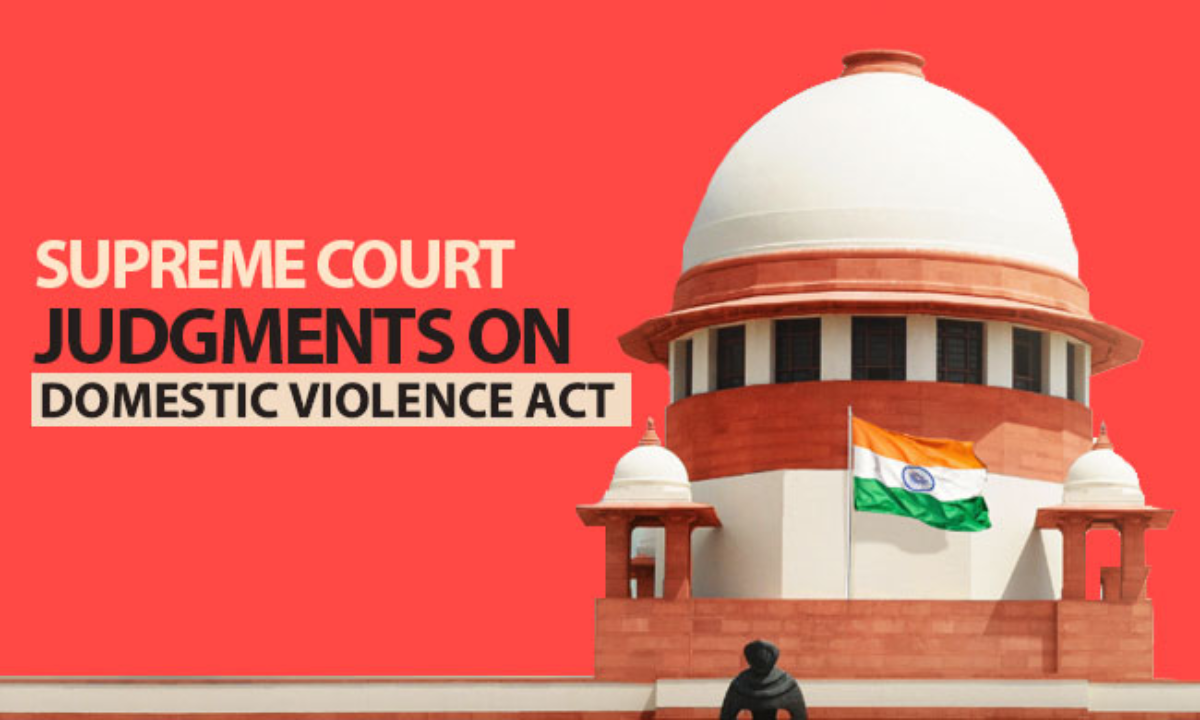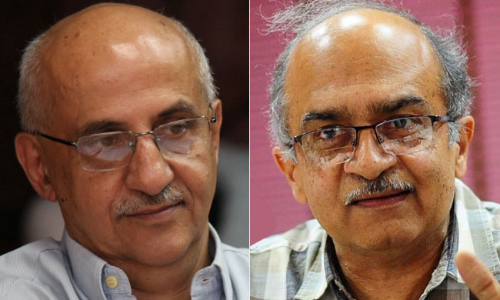
Top StoriesNews UpdatesColumnsInterviewsForeign/InternationalEnvironmentRTIKnow the LawVideos
Home > Top Stories > Recent Supreme Court Judgments On Domestic Violence Act [2006-2019]
Recent Supreme Court Judgments On Domestic Violence Act [2006-2019]
Update: 2019-07-09 08:17 GMT

![]()
The Protection of Women from Domestic Violence Act, 2005 came into force on 26 October 2006. The stated objective of the Act is "to provide for more effective protection of the rights of women guaranteed under the Constitution who are victims of violence of any kind occurring within the family".
The Supreme Court of India has made some significant interventions and interpretations in the operation of this law. The scope of this article is to consolidate almost every Supreme Court rulings in relation to this Act.
Shared Household and Alternative Accommodation
[S.R. Batra vs Taruna Batra (2006)]
About two months after the Domestic Violence Act came into force, the Supreme Court in this judgment, interpreted some provisions of the Act. In this case, the court dealt with the submission on behalf of the wife that the definition of shared household includes a household where the person aggrieved lives or at any stage had lived in a domestic relationship. The court held, referring to Section 17(1), Section 2(s), that the wife is only entitled to claim a right to residence in a shared household, and a `shared household' would only mean the house belonging to or taken on rent by the husband, or the house which belongs to the joint family of which the husband is a member.
Also, Interpreting Section 19(1)(f), the bench comprising Justices S.B. Sinha & Markandey Katju observed that the claim for alternative accommodation can only be made against the husband and not against the husband's in-laws or other relatives.Thus, in facts of the case, it was held that wife could not claim a right of residence in the property belonging to her mother-in-law'
Click to Read/Download Judgment
Requirements Of A 'Relationship in Nature of Marriage'
[D. Velusamy vs. D. Patchaiammal (2010)]
In this case, the court noted that the definition of 'Domestic relationship' in Section 2(f) of the Act includes not only the relationship of marriage but also a relationship `in the nature of marriage'.
As the expression 'relationship in the nature of marriage' has not been defined under the Act, the bench explained its meaning. The bench comprising Justices Markandey Katju and TS Thakur said that not all live in relationships will amount to a 'relationship in the nature of marriage' which must fulfill the below mentioned requirements (common law marriage requirements), and in addition the parties must have lived together in a 'shared household'.
• The couple must hold themselves out to society as being akin to spouses.
• They must be of legal age to marry
• They must be otherwise qualified to enter into a legal marriage, including being unmarried.
• They must have voluntarily cohabited and held themselves out to the world as being akin to spouses for a significant period of time.
It was further held that merely spending weekends together or a one night stand would not make it a 'domestic relationship'. If a man has a 'keep' whom he maintains financially and uses mainly for sexual purpose and/or as a servant it would not, be a relationship in the nature of marriage', the Court said.
Click to Read/Download Judgment
Complaints Can Be Filed Against Female Relatives Of Husband
[Sandhya Manoj Wankhade vs Manoj Bhimrao Wankhade (2011)]
Interpreting the expression "respondent" in Section 2(q) of the Act, the Court held that the female relatives of the husband or male partner are not excluded from the ambit of a complaint. It was held that an aggrieved wife or a female living in a relationship in the nature of a marriage can file complaint against a relative of the husband or male partner. The bench comprising Justices Altamas Kabir and Cyriac Joseph observed as follows:
"From the above definition it would be apparent that although Section 2(q) defines a respondent to mean any adult male person, who is or has been in a domestic relationship with the aggrieved person, the proviso widens the scope of the said definition by including a relative of the husband or male partner within the scope of a complaint, which may be filed by an aggrieved wife or a female living in a relationship in the nature of a marriage."It is true that the expression "female" has not been used in the proviso to Section 2(q) also, but, on the other hand, if the Legislature intended to exclude females from the ambit of the complaint, which can be filed by an aggrieved wife, females would have been specifically excluded, instead of it being provided in the proviso that a complaint could also be filed against a relative of the husband or the male partner. No restrictive meaning has been given to the expression "relative", nor has the said expression been specifically defined in the Domestic Violence Act, 2005, to make it specific to males only… In such circumstances, it is clear that the legislature never intended to exclude female relatives of the husband or male partner from the ambit of a complaint that can be made under the provisions of the Domestic Violence Act, 2005."
Click to Read/Download Judgment
Conduct Of Parties Prior To Coming Into Force Of DV Act Relevant
[V.D.Bhanot Vs Savita Bhanot (2012)]
In this case, the Supreme Court, upheld the view taken by the Delhi High Court that the conduct of the parties even prior to the coming into force of the Domestic Violence Act, could be taken into consideration while passing an order under Sections 18, 19 and 20 thereof. Even if a wife, who had shared a household in the past, but was no longer doing so when the Act came into force, would still be entitled to the protection of the Act, the bench comprising Justice Altamas Kabir and J. Chelameswar held.
Click to Read/Download Judgment
How To Test Live-In Relationship Is In Nature Of Marriage
[ Indra Sarma Vs. VKV Sarma (2013)]
Whether a "live-in relationship" would amount to a "relationship in the nature of marriage" falling within the definition of "domestic relationship" under Section 2(f) of the DV Act and the disruption of such a relationship by failure to maintain a women involved in such a relationship amounts to "domestic violence" within the meaning of Section 3 of the DV Act? This was the issue considered by the Apex Court in this case.
The bench comprising Justice K.S. Radhakrishnan and Pinaki Chandra Ghose, after an elaborate discussion on the subject, laid down following guidelines for testing under what circumstances, a live-in relationship will fall within the expression "relationship in the nature of marriage"?
Duration of period of relationship- Section 2(f) of the DV Act has used the expression "at any point of time", which means a reasonable period of time to maintain and continue a relationship which may vary from case to case, depending upon the fact situation.
Shared household- The expression has been defined under Section 2(s) of the DV Act and, hence, need no further elaboration.
Pooling of Resources and Financial Arrangements-Supporting each other, or any one of them, financially, sharing bank accounts, acquiring immovable properties in joint names or in the name of the woman, long term investments in business, shares in separate and joint names, so as to have a long standing relationship, may be a guiding factor.
Domestic Arrangements-Entrusting the responsibility, especially on the woman to run the home, do the household activities like cleaning, cooking, maintaining or upkeeping the house, etc. is an indication of a relationship in the nature of marriage.
Sexual Relationship-Marriage like relationship refers to sexual relationship, not just for pleasure, but for emotional and intimate relationship, for procreation of children, so as to give emotional support, companionship and also material affection, caring etc.
Children- Having children is a strong indication of a relationship in the nature of marriage. Parties, therefore, intend to have a long standing relationship. Sharing the responsibility for bringing up and supporting them is also a strong indication.
Socialization in Public-Holding out to the public and socializing with friends, relations and others, as if they are husband and wife is a strong circumstance to hold the relationship is in the nature of marriage.
Intention and conduct of the parties- Common intention of parties as to what their relationship is to be and to involve, and as to their respective roles and responsibilities, primarily determines the nature of that relationship
Click here to Read/Download Judgment
Deprecated Tendency To Implead All And Sundry As Respondents In Complaint
[Ashish Dixit vs. State of UP (2013)]
In this case, the aggrieved wife had, apart from arraying her husband and her parents-in-law as parties to the proceedings, included all and sundry, as respondents in the complaint filed under DV Act. The bench comprising Justices H.L. Dattu and Chandramauli Kr. Prasad quashed the complaint against all respondents except husband and parents in law.
Click here to Read/Download Judgment
HC Should Be Slow In Passing Interim Orders Interfering With Maintenance Order Passed Under DV Act
[Shalu Ojha vs. Prashant Ojha (2014)]
In this case,The Magistrate ordered the husband to pay maintenance of Rs.2.5 lakhs per month. The husband assailed the order before the Sessions Court, which eventually dismissed the appeal as he did not comply with the conditional order. The interference made by the High Court in the order granting maintenance was assailed before the Apex Court,.
The Supreme Court bench comprising of Justice J. Chelameswar and Justice AK Sikri, observed that, in a matter arising under a legislation meant for protecting the rights of the women, observed that the High Court should have been slow in granting interim orders, interfering with the orders by which maintenance is granted to the appellant.
Click here to Read/Download Judgment
Wife Can Be 'Aggrieved Person' Even After Judicial Separation
[Krishna Bhatacharjee vs. Sarathi Choudhury (2015)]
It was held that only because a decree of Judicial separation is passed, a wife does not cease to be an 'aggrieved person' for the purpose of Domestic Violence Act. The bench of Justices Dipak Misra and Prafulla C. Pant noted that once the decree of divorce is passed, the status of the parties becomes different, but that is not so when there is a decree for judicial separation. The court observed that the finding of the court below that since the parties having been judicial separated, the wife has ceased to be an "aggrieved person", is wholly unsustainable
Click here to Read/Download Judgment
Courts Not Powerless To Allow Amendment Of Domestic Violence Complaints
[Kunapareddy @ Nookala Shanka Balaji vs. Kunapareddy Swarna Kumari (2016)]
In this case, the Court held that amendments of complaints or petitions filed under Section 12 of the Domestic Violence Act can be allowed. If the power to amend the complaint/application etc. is not read into the aforesaid provision, the very purpose which the Act attempts to sub-serve itself may be defeated in many cases, the bench comprising of Justices AK Sikri and RK Agrawalsaid.
Click here to Read/Download Judgment
Unsuccessful Divorce Proceedings Cannot Adversely Affect Maintainability Of Application Filed Under DV Act
[Rakash Nagardas Dubal Shaha VS. Meena Prakash Dubal Shahhas (2016)]
The Supreme Court, in this case, held that, unsuccessful divorce proceedings cannot adversely affect the maintainability of application filed by the contesting respondents under the Act. The Sessions Court, in the instant case, had held the application not maintainable on the ground that since the husband wife had initiated divorce proceedings at an earlier point of time, the Protection of Women from Domestic Violence Act which came into force only later. The bench comprising Justice Dipak Misra and Justice Shiva Kirti Singh upheld the High Court judgment that had set aside the Sessions Court order.
Click here to Read/Download Judgment
Relief Under DV Act Can Be Sought Against Minors, Women
[Hiral P Harsora Vs. Kusum Narottamdas Harsora (2016)]
The Supreme Court struck down the words "adult male" before the word "person" in Section 2(q) of Domestic Violence Act holding that these words discriminate between persons similarly situated, and is contrary to the object sought to be achieved by the Act. The bench comprising Justice Kurian Joseph and Justice RF Nariman said that if the "respondent" is to be read as only an adult male person, it is clear that women who evict or exclude the aggrieved person are not within its coverage, and if that is so, the object of the Act can very easily be defeated by an adult male person not standing in the forefront, but putting forward female persons who can, therefore, evict or exclude the aggrieved person from the shared household. The Court also said it is also possible that a non-adult 16 or 17 year old member of a household, can aid or abet the commission of acts of domestic violence, or who can evict or help in evicting or excluding from a shared household an aggrieved person.
Click here to Read/Download Judgment
'Domestic Relationship' Necessary To Permit A Party To Occupy 'Shared Household'
[Manmohan Attavar Vs Neelam Manmohan Attavar (2017)]
In this case, it was observed that to issue an order under the Domestic Violence Act permitting a party to occupy a household, it is necessary that the two parties had lived in a domestic relationship in the household. The bench comprising Justice RF Nariman and Justice Sanjay Kishan Kaul observed that the "domestic relationship", as defined under Section 2 (f) of the DV Act, refers to two persons who have lived together in a "shared household" as defined under Section 2(s) of the DV Act.
Click here to Read/Download Judgment
Live-In Partner Can Seek Maintenance Under Provisions Of Domestic Violence Act
[Lalita Toppo vs. State of Jharkhand (2018)]
In this case, the Supreme Court observed that a live-in partner can seek maintenance under the provisions of the Protection of Women from Domestic Violence Act, 2005. A three judge bench made this observation while considering a reference to it from a two judge bench on the scope of Section 125 CrPC vis-a-vis live in relationship. The two judge bench had referred the matter while considering an appeal against Jharkhand High Court Judgment that held that Section 125 CrPC does not provide for the grant of maintenance to a woman who is not legally married to the person to whom such maintenance is claimed.
Referring to provisions of Domestic violence Act, the bench observed that the petitioner, in this case, would have an efficacious remedy to seek maintenance under the Act even assuming that she is not the legally wedded wife and, therefore, not entitled to maintenance under Section 125 of the Code of Criminal Procedure, 1973. It also said that economic abuse also constitutes domestic violence as per the provisions of the Act.
Click here to Read/Download Judgment
Brother In Law Ordered To Pay Maintenance To Widow Under DV Act
[Ajay kumar vs. Latha @ Sharuti (2019)]
In this case, the Supreme Court upheldan order passed under DV Act directing a brother in law to pay maintenance to a widow. The lady and her deceased husband were residing at a house which constitutes ancestral Hindu Joint Family Property.The deceased husband and the brother in law jointly carried on a business of a kiryana store. The woman, filed a complaint under Domestic Violence Act alleging that, after the death of her husband she and her child was not permitted to reside in her matrimonial home. The Trial court passed an interim order granting monthly maintenance in the amount of Rs 4,000 to the woman and Rs 2,000 to the child. The brother in law was directed to pay the said amount. Rejecting the contention of the 'brother in law' that there is no provision to pass an order of maintenance against him, the bench comprising Justice DY Chandrachud and Justice Hemant Gupta observed that the substantive part of Section 2(q) indicates that the expression "respondent" means any adult male person who is, or has been, in a domestic relationship with the aggrieved person and against whom relief has been sought
Click here to Read/Download Judgment
Similar News
'Whether Rohingyas Entitled To Refugee Status in India?' SC Agrees To Hear In August
SC Dismisses 'Saravana Bhavan' Founder Rajagopal's Plea To Extend Time To Surrender In Murder Case
SC Asks Centre To Provide Info On Detention Centres And Foreigners Detained In Assam [Read Order]
Follow:
Copyright © 2019.
Powered by Hocalwire
![]()








ಕಾಮೆಂಟ್ಗಳಿಲ್ಲ:
ಕಾಮೆಂಟ್ ಪೋಸ್ಟ್ ಮಾಡಿ